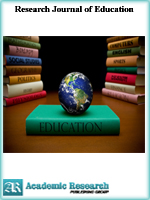Research Journal of Education
Online ISSN: 2413-0540
Print ISSN: 2413-8886
Print ISSN: 2413-8886
Quarterly Published (4 Issues Per Year)

Archives
Volume 3 Number 7 July 2017
Social Life Adjustment and Academic Achievement of Adolescents in the Northwest Region of Cameroon: What Counsellors Need to Know
Authors: Einstein Moses Egebe Anyi
Pages: 69-74
Abstract
This study aimed at finding out the effects of social life adjustment on the academic achievements of adolescents in secondary schools in the North West Region of Cameroon and also to verify if the social life adjustment and academic achievement apply equally for both male and female. Four hundred and eighty (480) students were randomly sampled from three secondary schools in major urban areas of the Region. The descriptive survey design was used for the study. A self-constructed questionnaire with the Likert scale on social life adjustment was used to gather the necessary data. Two null hypotheses were formulated and tested at the 0.05 level of significance. The data were analysed using the chi-square and Fishers’ Z scores for gender. The findings revealed that social life adjustment had significant influence on students’ academic achievements in secondary schools in the North West Region of Cameroon. It was also found that there exist no significant difference in the effects of social life adjustment on academic performance between boys and girls. Based on these findings, it was recommended amongst others that, counsellors should constantly monitor and guide adolescents properly during class periods, recess periods and extracurricular activities in order for them to achieve academically. Keywords: Social life adjustment; Adolescents; Academic achievements; Cameroon.
Moroccan EFL Learners Identity: Does It Reflect the Profile of the Intercultural Speaker?
Authors: Karim EL Hiani
Pages: 62-68
Abstract
The process of globalization has brought a number of modern issues and perspectives to the landscape of foreign language education including influences on EFL learners’ identity. Being exposed to local cultures together with foreign cultures raises critical questions vis-à-vis identity construction (Galajda, 2011; Guilherme, 2002; Houghton, 2013). Besides, as Niżegorodcew (2011) argues, questioning learners’ identity as simultaneously speakers of different national languages and English as a lingua franca (ELF) is at the heart of EFL concerns. Hence, much effort is highly recommended to investigate EFL learners’ identity in order to keep abreast of the growing issues including intercultural citizenship (Byram, 2009). In light of these controversial issues, the present paper provides a qualitative analysis about Moroccan EFL learners’ identity that reflects the desired profile of the ‘intercultural speaker’. The analysis is based on Byram’s framework of ICC (1997) that stresses mainly the ability of drawing on different cultural realities to highlight common issues and phenomena. Also, the paper aims at describing the development of the aforementioned identity among Moroccan EFL undergraduate learners. This paper, therefore, contributes to the extant literature on identity and intercultural communication.



